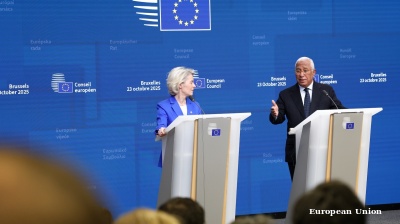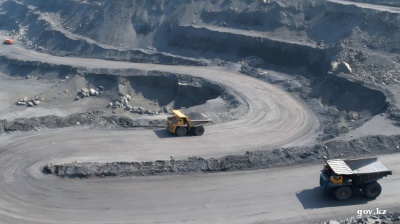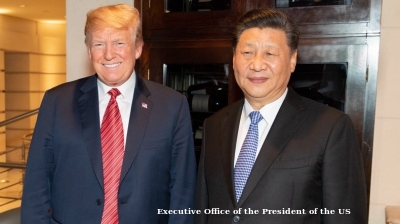French Ecology Minister Agnes Pannier-Runacher has pulled out of the COP29 climate summit in Baku, Azerbaijan, following remarks by Azerbaijani President Ilham Aliyev accusing France of “colonialist crimes” in its Pacific territory of New Caledonia.
The diplomatic row adds fresh strain to already tense relations between Paris and Baku, the day after Aliyev used his opening speech at the summit to launch a vigorous defence of fossil fuels and lash out at Western nations, accusing them of hypocrisy in their climate stances.
Aliyev, hosting this year’s United Nations climate summit, took aim at France’s record in New Caledonia during a combative speech on November 13 that resonated with delegates from some Pacific island states.
“The crimes of France in its so-called overseas territories would not be complete without mentioning the recent human rights violations,” Aliyev said, referring to protests that swept the French territory in May.
He alleged that the French government had responded with excessive force, “killing 13 people and wounding 169 … during legitimate protests by the Kanak people in New Caledonia.”
The comments drew strong reactions in Paris, with Pannier-Runacher denouncing Aliyev’s statements as “unacceptable… and beneath the dignity of the presidency of the COP.” Addressing lawmakers in Paris, she said she would not attend the talks in protest at what she described as a “flagrant violation of the code of conduct” governing United Nations climate meetings.
The dispute comes amid longstanding tensions between the two nations, fueled by France’s support for Armenia, Azerbaijan’s regional rival. Azerbaijan seized control of the Nagorno-Karabakh region, which had been under Armenian administration for decades, during a 2023 military offensive that led to the mass displacement of over 100,000 ethnic Armenians.
France has condemned Azerbaijan’s actions in Nagorno-Karabakh and maintains a robust diplomatic alliance with Armenia, a stance that has frequently drawn criticism from Baku.
French officials also accused Baku of fomenting the riots in New Caledonia by supporting pro-independence movements to punish France for its backing of Armenia, a claim denied by Azerbaijan. In September, a Frenchman was among three foreigners sentenced in Azerbaijan for defacing the Baku metro with graffiti.
“Double standards”
The previous day, Aliyev’s opening speech on November 12 was equally controversial. The Azerbaijani president criticised Western governments for what he described as "double standards" and "political hypocrisy”, accusing them of both consuming Azerbaijani gas while condemning his nation for its environmental policies.
“Unfortunately, double standards, a habit to lecture other countries, and political hypocrisy have become a modus operandi for some politicians, state-controlled NGOs, and fake news media in certain Western countries,” Aliyev said.
Such blunt language, not to mention the spirited defence of fossil fuels, is unusual to say the least at the COP climate summits.
Aliyev promoted some of Azerbaijan's renewable energy projects, which are also controversial given most of its solar initiatives in the disputed Nagorno-Karabakh region.
However, he did not introduce an updated national climate plan, which had been anticipated. Instead, he took the opportunity to underscore his country’s reliance on oil and gas, reiterating that he views them as “a gift of the gods”
“Countries should not be blamed for having [oil and gas] and should not be blamed for bringing these resources to the market because the market needs them. The people need them.”
The Azerbaijani leader also rejected the label of “petrostate", pointing out that Azerbaijan contributes less than 1% of global oil and gas output. He contrasted this with the US, which, he said, produces far more fossil fuels yet regularly critiques other nations for their reliance on oil and gas. “American fake news media should look at their own country,” Aliyev argued.
Azerbaijan’s economy is heavily dependent on fossil fuels, making it a controversial choice to host the COP29 summit.
However, the country, despite its poor human rights record, has become an increasingly important energy supplier to European countries, as they try to diversify away from Russian gas.
Aliyev's speech also took aim at environmental activists and civil society groups that had called for a boycott of the conference, criticising Azerbaijan’s environmental and human rights record.
“I have bad news for them,” Aliyev said. “We have 72,000 registered participants from 196 countries… so the world gathered in Baku, and we say to the world: Welcome to Azerbaijan.”
Shortly after Aliyev’s remarks, UN Secretary-General Antonio Guterres offered a contrasting perspective, saying that any climate plans aligned with limiting global warming to 1.5 degrees Celsius would require a 30% cut in global fossil fuel production and consumption by 2030.
“Doubling down on fossil fuels is absurd,” Guterres said. He added, “Scientists, activists, and young people are demanding change – they must be heard, not silenced.”
News
_1761305900.jpg)
Latin America edges up growth forecasts but remains trapped in low gear, ECLAC says
Latin America and the Caribbean will expand 2.4% this year, the Economic Commission for Latin America and the Caribbean said, marking the second upward revision since April but pointing to the region's struggle to escape chronically weak growth.

Palestinian ambassador pledges Iraqi embassy in Jerusalem
Palestinian ambassador pledges to open Iraqi embassy in Jerusalem as Iraq lays foundation stone for Palestinian ambassador's residence in Baghdad's new diplomatic quarter covering 300 hectares.

EU pledges ongoing support for Ukraine, defers decision on Russian assets
European Union leaders pledged continued financial backing for Ukraine over the next two years, but delayed a decision on tapping billions of euros in frozen Russian assets to fund Kyiv’s defence

Trump Administration striving to strike critical minerals deal with Kazakhstan
Pushing for US firm to win rights to develop major tungsten deposits.



_seen_here_meeting_with_Congressman_Jimmy_Panetta_201025_Cropped_1760946356.jpg)
